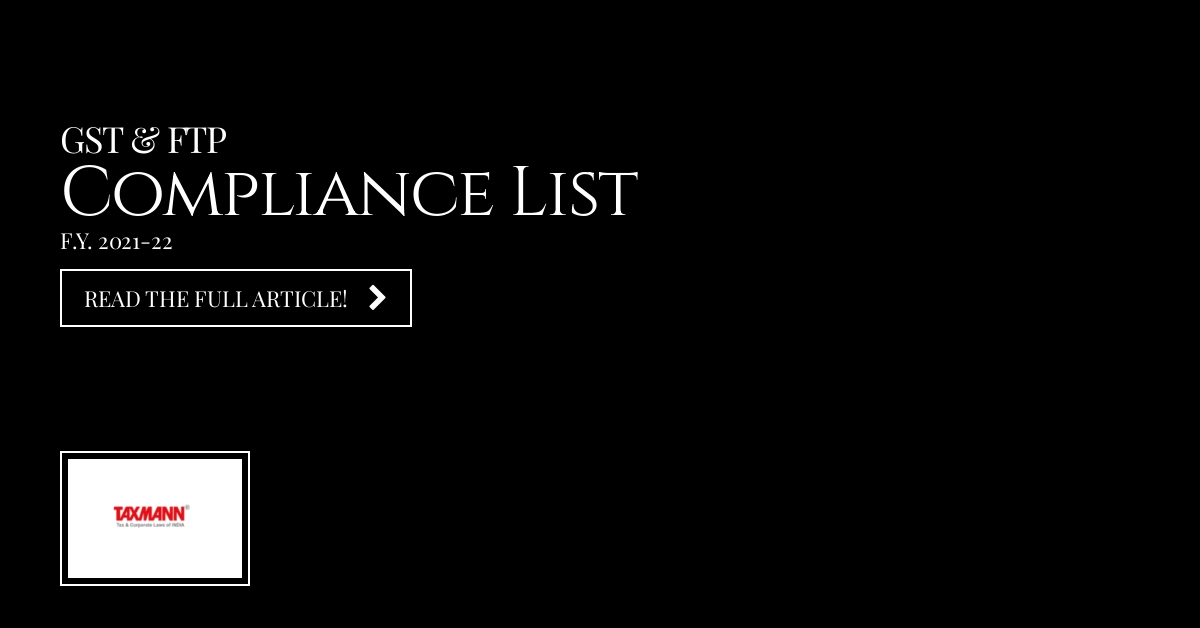GST & FTP Compliance List for F.Y. 2021-22
- Blog|GST & Customs|
- 2 Min Read
- By Taxmann
- |
- Last Updated on 30 March, 2022

As the end of Financial Year 2021-22 is approaching, one may need to carry out certain
activities for complying with GST laws relating to Financial Year 2021-22 as well as for
Financial Year 2022-23. These activities would be required to be done on or before March 31, 2022.
The to-do list from GST standpoint is summarized as under:
1. Unique Series for Invoice
Starting from Financial Year 2022-23, businesses would be required to start a new and
unique series of invoices or bill of supply or other documents to be issued under GST.
This book might interest you
2. LUT for FY 2022-23
The supplier engaged in making zero-rated supply are required to apply for renewal
of Letter of Undertaking (LUT) for the financial year 2022-23 before the year-end i.e. on
or before March 31, 2022.
3. Reversal of ITC (Rule 42 and 43 of the CGST Rules)
The effect of the consolidated working of Rule 42 and 43 relating to common inputs
and input services used for providing taxable and exempted supplies is required to be
taken in the returns for the month of March 2022 in order to avoid additional interest
burden.
This book might interest you
4. Annual Reconciliation
The reconciliation shall be prepared to identify the mismatches between GSTR-1 and
GSTR-3B liabilities along with books. Similarly, GSTR-2A/2B reconciliation with
books shall be prepared in order to avoid any loss of ITC. Also, it is advisable to
reconcile E-way Bill data with GSTR-1.
This book might interest you
5. Finalisation of Cross Charge
The Cross-charge of common expenses incurred by Head Office to other distinct
persons or branches or related entities with common management should be finalized.
6. 80% ITC from Registered Persons for Real Estate Industry
In respect of construction services projects that attract GST rate of 1%/5%, the supplier
is required to procure 80% of the total procurement of input and input services from
GST registered vendors.
The shortfall is required to be paid within the end of the quarter following the
financial year .The GST on shortfall shall be paid under reverse charge at the rate of
18%. The necessary workings should be done to determine the tax liability.
This book might interest you
7. Renewal of RCMC certificate
The Registration Cum Membership Certificate under Foreign Trade Policy is effective
for the period of 5 financial years. The certificates validity ending on financial year
2021-22 are required to be renewed.
8. Applicability of E-Invoicing provisions
The registered persons having an aggregate turnover exceeding Rs. 20 crores in any of
the financial years (FY) beginning from the FY 2017-18 onwards shall be required to
comply with E-invoicing provisions and have to generate E-invoices with effect from
April 1, 2022.
This book might interest you
9. Renewal of IEC Code
The Foreign Trade Policy mandates updating details of the IEC every year on the
DGFT portal. Such details can be updated from April to June of the relevant Financial
Year. A confirmation is also required to be provided even if there are no changes in the
IEC details.
This book might interest you
Disclaimer: The content/information published on the website is only for general information of the user and shall not be construed as legal advice. While the Taxmann has exercised reasonable efforts to ensure the veracity of information/content published, Taxmann shall be under no liability in any manner whatsoever for incorrect information, if any.

Taxmann Publications has a dedicated in-house Research & Editorial Team. This team consists of a team of Chartered Accountants, Company Secretaries, and Lawyers. This team works under the guidance and supervision of editor-in-chief Mr Rakesh Bhargava.
The Research and Editorial Team is responsible for developing reliable and accurate content for the readers. The team follows the six-sigma approach to achieve the benchmark of zero error in its publications and research platforms. The team ensures that the following publication guidelines are thoroughly followed while developing the content:
- The statutory material is obtained only from the authorized and reliable sources
- All the latest developments in the judicial and legislative fields are covered
- Prepare the analytical write-ups on current, controversial, and important issues to help the readers to understand the concept and its implications
- Every content published by Taxmann is complete, accurate and lucid
- All evidence-based statements are supported with proper reference to Section, Circular No., Notification No. or citations
- The golden rules of grammar, style and consistency are thoroughly followed
- Font and size that’s easy to read and remain consistent across all imprint and digital publications are applied



 CA | CS | CMA
CA | CS | CMA
